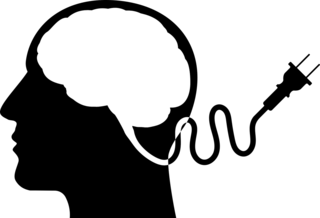Creativity
How to Boost Brain Power in the Blink of an Eye
Improve memory, increase performance, and kick-start creativity with this trick.
Posted March 20, 2019 Reviewed by Davia Sills

Brain drain is a chronic problem in modern life. Our brains are overworked, overstressed, and under-rested. So is it any wonder that we often find ourselves struggling to recall an important detail or feeling as if our creative juices are drained?
But it doesn’t have to be this way. Several techniques have been shown to invigorate our brain and get it working at its full potential. Sleep, meditation, and mindfulness are all strategies that can help boost our brain’s functions. But they take a long time to cultivate and master. In this age of quick fixes, are there any short-term options to boost your brain?
Yes, and it’s a simple one: Try closing your eyes.
Have you ever noticed that when little kids are trying their hardest to remember something, they squeeze their eyes closed? They may be on to something. Several studies over the past few years show that closing your eyes boosts brain power, improves memory, and even ignites creativity.
For example, one study had people watch a video of a simulated crime. Later they were asked to recall details of the video—like the time displayed on a wall clock or the number of people at the scene—with either their eyes closed or eyes open. The results showed that eyewitnesses who closed their eyes during recall remembered 44 percent more correct details than those who kept their eyes open.
But memory isn’t the only thing that improves when our eyes are wide shut. Our creativity and ingenuity also get a boost.
In one study, people were given two common measures of creativity. The first, called the Alternative Uses Test, helps assess divergent thinking (i.e., coming up with multiple ideas or solutions to a problem). In this test, people are asked to generate new uses for a common object. For example, innovative uses for an iron would be to make a grilled cheese sandwich or heat a can of soup. The second measure, called the Remote Associates Test, assesses convergent thinking (i.e., coming up with the single best solution to a problem). In the RAT test, people are given three words and must generate a fourth related to the initial three. For example, the words "tree," "pie," and "drop" are all related to the word lemon.
In the study, half of the respondents completed these tests with their eyes open, and half with their eyes closed. The results: For both tests, people who responded with their eyes shut had test scores nearly double that of their eyes-wide-open counterparts.
But why does closing our eyes boost our brain?
The answer is simple: Your brain is a machine like any other. It only has a limited amount of attention and energy. And one of the tasks that sucks up a lot of this energy is sight. Hundreds of millions of neurons in our brain are solely devoted to vision—that’s an estimated 30 percent of our brain matter. When you compare that to the 8 percent of our brain dedicated to touch and the 3 percent to taste, you realize how much of a drain our visual system is to the brain.
So in theory, when you close your eyes, you free up the energy associated with that 30 percent and divert it toward the task at hand. It’s a bit like when you have a bunch of other programs running in the background of your computer or your phone, and everything gets a bit sluggish. If you close those programs and free up your processor, things start running a lot more efficiently.
This may be news to you, but it isn’t news to your brain. In fact, there is evidence to suggest that your brain intuitively knows that closing its eyes can improve its performance. As I noted earlier, kids seem to just do this instinctively. And an international study conducted in 2015 found that people blink more frequently and for longer just before they are about to solve a creative problem.
The point is this: There are several techniques you can choose to use to boost your brainpower, but none are as easy, quick, and cost-free as simply closing your eyes. So the next time you are struggling to remember someone’s name or figure out a test question or even push past a creative block, give this simple trick a try. Just close your eyes and open your brain’s potential.


